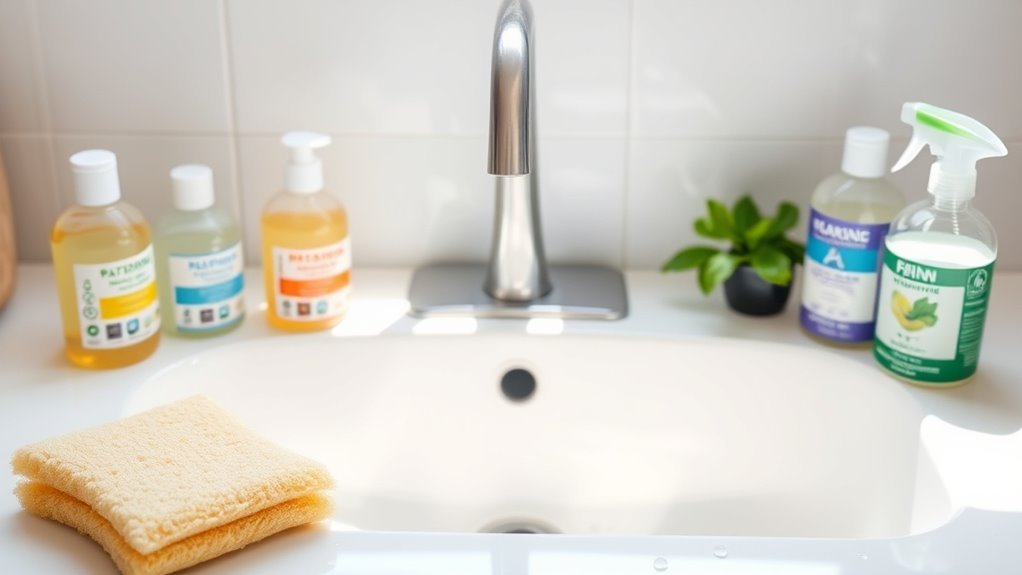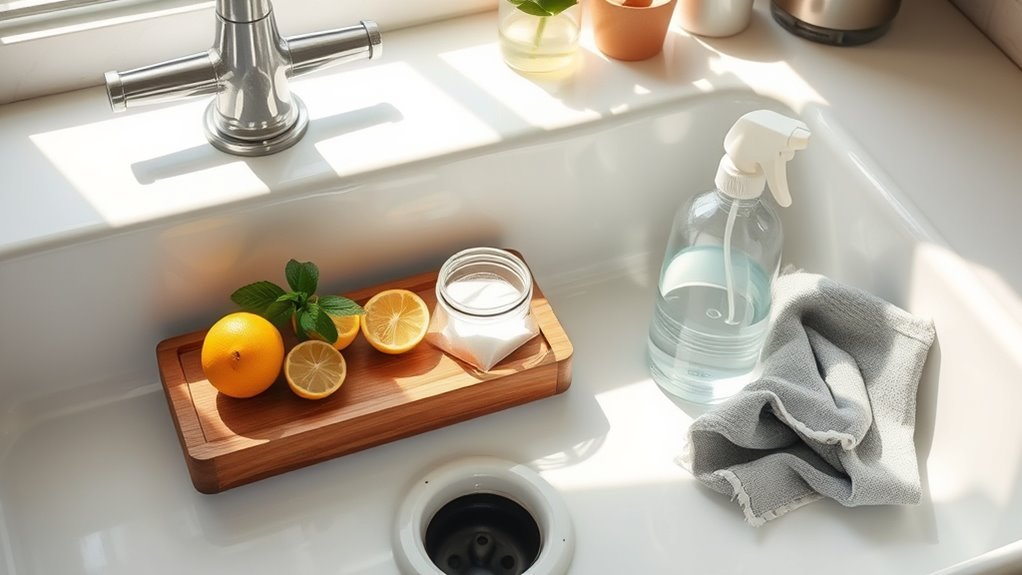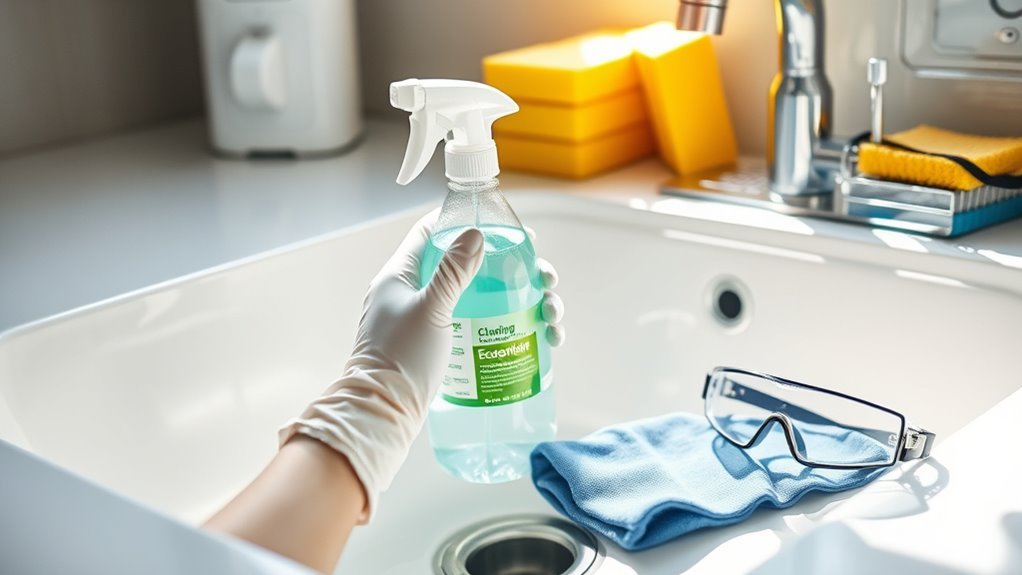How to Clean Your Sink Safely
To clean your sink safely, choose cleaners suited to your sink’s material—use gentle, non-abrasive products for stainless steel and mild detergents for porcelain. Natural options like baking soda and vinegar work well without harsh chemicals. Always wear gloves, guarantee good ventilation, and avoid mixing cleaners to protect yourself. Rinse and dry your sink regularly to prevent stains and bacteria buildup. Keep these simple tips in mind, and you can explore more ways to maintain a sparkling, germ-free sink.
Choosing the Right Cleaning Products for Your Sink

When selecting cleaning products for your sink, it’s important to contemplate the material it’s made from. You want cleaning tools and solutions that won’t damage the surface but still deliver product effectiveness. For example, stainless steel sinks need non-abrasive cleaners and soft brushes to avoid scratches. Porcelain or ceramic sinks can handle gentler scrubbing pads with mild detergents. Choosing the right product means you’re not restricted by harsh chemicals, giving you the freedom to maintain your sink safely and efficiently. Keep in mind that natural or eco-friendly options often provide excellent results without compromising your sink’s finish. Selecting wisely guarantees your cleaning routine is both safe for the material and effective, letting you enjoy a fresh, spotless sink without worry.
Step-by-Step Guide to Cleaning Different Types of Sinks
Selecting the right cleaning products sets the stage for effective sink care. Different sink materials require tailored cleaning techniques to keep them looking fresh and lasting longer. Here’s a simple step-by-step guide to regain control over your sink’s shine:
- Stainless Steel Sinks: Use a gentle, non-abrasive cleaner and a soft cloth to avoid scratches. Rinse thoroughly and dry to prevent water spots.
- Porcelain Sinks: Apply a mild detergent with a sponge, focusing on stains. Avoid harsh scrubbing to protect the glaze.
- Composite or Granite Sinks: Use a pH-balanced cleaner and a soft brush. Rinse well to remove residue.
Natural Alternatives to Harsh Chemical Cleaners

Although harsh chemical cleaners might seem effective, you don’t have to rely on them to keep your sink spotless. You can embrace natural alternatives that are safe, affordable, and powerful. Baking soda is a fantastic option—it’s mildly abrasive, so it scrubs away grime without scratching surfaces. Sprinkle some baking soda on your sink, then scrub gently with a damp cloth or sponge. For tougher stains and odors, vinegar benefits come into play. Vinegar acts as a natural disinfectant and cuts through mineral deposits and soap scum effortlessly. Just pour some white vinegar over the baking soda, let it fizz for a few minutes, then rinse thoroughly. Using these simple ingredients lets you clean your sink effectively while avoiding harsh chemicals, giving you freedom from toxins and protecting your home environment.
Tips for Maintaining a Germ-Free and Stain-Free Sink
Using natural ingredients like baking soda and vinegar not only cleans your sink but also helps keep germs and stains at bay. For effective sink maintenance and germ prevention, you can take control of your environment with these simple tips:
- Daily rinse and wipe: Quickly rinse your sink after each use and wipe it dry to prevent water spots and bacteria buildup.
- Weekly deep clean: Use a paste of baking soda and vinegar to scrub away stubborn stains and kill germs without harsh chemicals.
- Avoid clogging: Regularly clear debris from the drain to prevent slow drainage and unpleasant odors.
Safety Precautions While Cleaning Your Sink

When you clean your sink, it’s important to take safety precautions to protect yourself from harmful chemicals and avoid accidents. Always prioritize gloves usage; wearing gloves shields your skin from harsh cleaners and potential irritants. Don’t skip this simple step—it’s your first line of defense. Next, remember the ventilation importance. Open windows or turn on exhaust fans to keep fresh air flowing. This reduces fumes that can make you dizzy or cause headaches. Also, avoid mixing cleaning products, as this can create dangerous reactions. Keep your workspace clutter-free to prevent slips or spills. By following these straightforward safety measures, you maintain your freedom to clean effectively without risking your well-being. Stay safe, and enjoy a sparkling sink without compromise.
Frequently Asked Questions
Can Sink Cleaning Improve Water Drainage?
Imagine a sink clogged and sluggish, contrasting sharply with one that flows freely. When you keep up with sink maintenance, you’re not just avoiding drainage issues—you’re reclaiming freedom from constant worry and hassle. Regular cleaning clears away buildup that blocks water flow, so your sink drains smoothly. You’ll enjoy a hassle-free kitchen, letting you focus on what truly matters instead of battling slow drainage or unexpected backups.
How Often Should Sink Drains Be Professionally Cleaned?
You should get professional sink drain cleaning roughly every 1-2 years, depending on your usage and local water quality. Regular drain maintenance helps prevent buildup and keeps things flowing freely, so you’re not stuck dealing with clogs. Scheduling plumbing inspections alongside drain cleaning lets you catch any hidden issues early, giving you peace of mind and the freedom to use your sink without worry or inconvenience.
What Causes Persistent Sink Odors Despite Cleaning?
Ah, the mysterious sink odor that just won’t quit—like a rebellious roommate who refuses to leave no matter how many eviction notices you post. You might think you’re the king or queen of cleanliness, but persistent smells usually come from sneaky drainage issues and hidden odor sources lurking beneath the surface. Don’t let these invisible nuisances imprison your freedom; tackle those clogs and grime to reclaim your sink’s fresh, odorless liberty!
Are There Specific Cleaning Methods for Antique Sinks?
When cleaning antique sinks, you’ll want to respect antique materials by avoiding harsh chemicals that can cause damage. Instead, stick to gentle solutions like mild soap and warm water, or a mix of baking soda and vinegar. You don’t have to be limited by aggressive cleaners; preserving the sink’s character means choosing methods that maintain its freedom to shine without harm. Always test a small area first to keep your sink looking timeless.
Can Sink Cleaning Prevent Mold Growth Under the Sink?
Absolutely, regular sink maintenance plays a big role in mold prevention. When you keep your sink clean and dry, you reduce the moisture that mold loves to thrive on, especially under the sink where it’s often damp and dark. By tackling leaks, wiping down surfaces, and ensuring good ventilation, you’re not just cleaning—you’re protecting your space from mold growth. Staying proactive means you’ll enjoy a fresher, healthier home without hassle.






